Hi! Shea here. *Waving.* Here’s another Profile in Radical Hospitality, this one written by Allison Schoeppner. Allison is a regular at Thursday Supper and Interfaith Impact, and is on our… Continue reading Profiles in Radical Hospitality
Category: Domestic Poverty and Food Insecurity
Profiles in Radical Hospitality
Hi all! Shea here. *Waving.* This week’s post is a continuation of our Profiles in Radical Hospitality written by Alice Ragland, an OU student and another regular volunteer at UCM’s… Continue reading Profiles in Radical Hospitality
Profiles in Radical Hospitality
Hi there! Shea here. *Waving.* As part of our Better Together at OU blog, we’re going to be posting pieces written by folks who spend time at UCM programming related… Continue reading Profiles in Radical Hospitality
The White House Interfaith Challenge
Hi! *Waving.* My name is Shea Daniels. Welcome to the Better Together at Ohio University Blog! This week I’d like to tell you about the White House Interfaith Challenge, mostly… Continue reading The White House Interfaith Challenge
